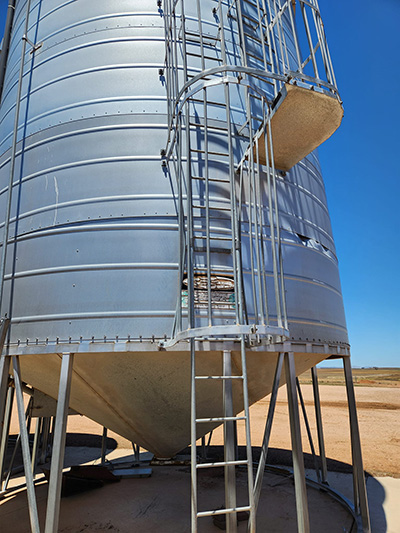A series of high-risk incidents involving the collapse of on-farm silos has industry experts calling on grain growers across the country to assess and either maintain or decommission older silos.
Grains Research and Development Corporation (GRDC) grain storage extension team specialist Chris Warrick offered the warning in the wake of several serious, on-farm incidents involving the collapse of silos in southern Australia.
Mr Warrick says while well maintained silos could last in excess of 30 years, growers needed to effectively check, assess and recognise when critical storage equipment was no longer fit for purpose or had been structurally compromised.
 GRDC grain storage specialist Chris Warrick is encouraging growers to consider if silos are safe and fit for purpose, damaged or worn out and due for repair or decommissioning. Photo: Brenton Vanstone
GRDC grain storage specialist Chris Warrick is encouraging growers to consider if silos are safe and fit for purpose, damaged or worn out and due for repair or decommissioning. Photo: Brenton Vanstone
“The potential risks to family members or farm staff if a silo fails is very serious, there are also implications for grain or other losses, so this is an issue that growers need to pay attention too,” he says.
“If a silo is not structurally sound, we strongly encourage growers to seek an alternative storage option, make repairs or decommission the silo to prevent further damage, injury or catastrophic failure of the silo.
“Storing pulses and fertilisers can be higher risk than cereal grains, with higher bulk density and different flow characteristics placing greater loads on silos which can cause them to fail if structural weak points are apparent in either the design, materials, corrosion, damage or modifications undertaken.
“These commodities require stronger wall sheets and/or wall supports and stronger cone bases than for cereal grains. Cracked concrete bases, unlevel bases, damaged silo legs or wall sheets, corroded rivets or bolts are known contributors to silos failing under load.”
The well-known Australian expert says a checklist for growers assessing silo integrity should include:
- Is the foundation the silo is sitting on stable?
- Are the support legs and base rings free of damage and rust and in sound condition?
- Are the wall sheets free of damage and rust?
- Are all fixings (rivets and bolts) in sound condition?
- Is the ladder structure (if applicable) in sound condition for safe use?
- Does cleaning and operating the silo pose a safety risk?
GRDC Grower Relations Manager – North, Graeme Sandral also urged growers to take extra care when out loading fertilisers as fertilisers absorb more moisture than stored grain.
“Growers should be aware that the northern and western sides of silos often have lower moisture, with higher moisture in the southern side of the silo.
“This can present risks when out loading with the dry side generally emptying first in the worst-case scenario this can lead to silo collapse.”
In addition to structural integrity, Mr Warrick encouraged growers to consider safe operation as part of the assessment.
“Whether it be for maintenance or monitoring grain, access to the top of silos is necessary so safe access is a requirement,” he says.
“Many older silos have unsafe ladders, some silos have been purchased without ladders, so the decision is to install safe ladders or an elevated walkway or use a mobile boom lift.
“Silos being fit for purpose includes a safe way to access the top.”
Mr Warrick encouraged growers to considering writing a maintenance or decommission plan for silos immediately following loading or out loading when any issues were front of mind.
“The decision to maintain or replace silos is critical for safe farming operations and needs to happen well in advance of harvest,” he says.
GRDC has information resources available via storedgrain.com.au with the national team of grain storage specialists available by phoning 1800 WEEVIL.

























































